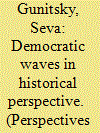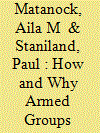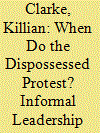|
|
|
Sort Order |
|
|
|
Items / Page
|
|
|
|
|
|
|
| Srl | Item |
| 1 |
ID:
161309


|
|
|
|
|
| Summary/Abstract |
For over two centuries, the evolution of democracy has been marked by repeated democratic waves. Yet these cross-border bursts of revolution and reform have varied widely in their origins, intensity, and success rates. How do we compare cascades of regime change, and what lessons do they offer about the spread of democracy? I lay out a historical framework of democratic waves that focuses on recurring causal mechanisms across time. Thirteen democratic waves are categorized according to two dimensions: 1) the origins of external influence, located in either vertical hegemonic transformations or in horizontal cross-border linkages; 2) the strength of external influence, taking the form of contagion when outside forces dominate and emulation when domestic focal points shape the timing of contention. This approach allows for more meaningful comparisons between these important, recurring, yet seemingly incomparable democratic waves. More generally, it suggests that the global history of democracy cannot be reduced to the sum of its national trajectories.
|
|
|
|
|
|
|
|
|
|
|
|
|
|
|
|
| 2 |
ID:
161311


|
|
|
|
|
| Summary/Abstract |
I offer a conceptual framework for assessing the normative legitimacy of coercive disobedience—involving threats, disruption, force, and deceit—by social movements. A standard liberal view is that while coercion may be required to resist authoritarian regimes, it is illegitimate in a democratic state since it conflicts with majority rule and mutual respect. In restricting disobedience to a form of moral persuasion, this perspective neglects how social power and material interests can distort the conditions for open, fair deliberation. I offer a principled defense of coercive disobedience, not only in repressive states but in plausibly democratic societies. I argue that coercion can be justified on democratic republican grounds as a means to collectively contest objectionable forms of political domination. The use of coercion can be justified as a surrogate tool of political action for those who lack effective participation rights; as a remedial tool to counteract the dominating influence of powerful actors over the process of democratic will formation, and as a mobilizational tool to maintain participation and discipline in collective action. I conclude by proposing democratic constraints on the use of coercive tactics designed to offset the potential movements themselves become a source of arbitrary power.
|
|
|
|
|
|
|
|
|
|
|
|
|
|
|
|
| 3 |
ID:
161314


|
|
|
|
|
| Summary/Abstract |
Armed actors are often involved in electoral politics, from the fusing of ballots and bullets in armed political parties to insurgents covertly backing politicians. We develop new concepts and theory to better understand these complex relationships between violent actors and democratic practice. We first offer a novel conceptualization of armed groups’ electoral strategies that systematically maps out variation in the organizational directness and public openness of groups’ involvement in elections. We then use comparative case studies to develop theory about the conditions under which each of these electoral strategies is most likely, and what can trigger changes between them. The interaction of armed groups’ power and expectations of popular support with governments’ policies of toleration or repression determines the strategies of electoral participation that groups pursue. These concepts and arguments lay the foundation for a systematic research agenda on when and how “normal” and armed politics become intertwined.
|
|
|
|
|
|
|
|
|
|
|
|
|
|
|
|
| 4 |
ID:
161307


|
|
|
|
|
| Summary/Abstract |
What explains the emergence of organized private enforcement in the United States? We study the formation of vigilance committees—that is, coercive groups organized in a manner not officially sanctioned by state law and with the purpose of establishing legal and moral claims. We argue that these committees were primarily intended to help create civic political identities in contexts of social ambiguity and institutional instability, what we call social frontiers. Relying on quantitative and qualitative analysis, we find that these committees were more likely to form in contexts where levels of ethno-nationalist heterogeneity were high and where political institutions had recently changed. Contrary to common wisdom, vigilance committees were much more than functionalist alternatives to an absent state, or local orders established by bargaining, or responses to social or economic conflict. They constituted flexible instruments to counteract environments characterized by social and political uncertainty.
|
|
|
|
|
|
|
|
|
|
|
|
|
|
|
|
| 5 |
ID:
161310


|
|
|
|
|
| Summary/Abstract |
Legitimacy is a key concept in political science. It has deep normative roots in democratic theory and refers usually to righteous, just, fair, and therefore acceptable rule. However, non-democracies also try to create a following among their citizens. They also engage in justifying their rule through politicization, be it of religion, ethnicity, or ideologies ranging from left-wing communism to right-wing nationalism. Against this backdrop, I pose the question: does it make sense to use the concept of legitimacy for both types of regimes, democracies and autocracies alike? Or, do we overstretch the concept when transplanting it to the non-democratic realm? And, empirically, how can we assess to what degree a non-democracy is viewed as legitimate by its citizens? I aim therefore at defining what legitimacy and legitimation is in autocratic settings; drawing a semantic map of rival concepts like support, trust, and loyalty; and tackling concrete challenges in measuring this elusive concept.
|
|
|
|
|
|
|
|
|
|
|
|
|
|
|
|
| 6 |
ID:
161313


|
|
|
|
|
| Summary/Abstract |
When debates about Islam acquire importance in the public sphere, does the far right adhere to traditional racist arguments, risking marginalization, or does it conform to mainstream values to attain legitimacy in the political system? Focusing on the aftermath of the 2015 terrorist attacks in France, I explore the framing of Islam, discussing how the far right’s nativist arguments were reformulated to engage with available discursive opportunities and dominant conceptions of the national identity. By looking at actors in the protest and the electoral arenas, I examine the interplay between the choice of anti-Islam frames and baseline national values.
|
|
|
|
|
|
|
|
|
|
|
|
|
|
|
|
| 7 |
ID:
161312


|
|
|
|
|
| Summary/Abstract |
Using violence or threat of violence, “thugs-for-hire” (TFH) is a form of privatized coercion that helps states subjugate a recalcitrant population. I lay out three scope conditions under which TFH is the preferred strategy: when state actions are illegal or policies are unpopular; when evasion of state responsibility is highly desirable; and when states are weak in their capacity or are less strong than their societies. Weak states relative to strong ones are more likely to deploy TFH, mostly for the purpose of bolstering their coercive capacity; strong states use TFH for evasion of responsibility. Yet the state-TFH relationship is functional only if the state is able to maintain the upper hand over the violent agents. Focusing on China, a seemingly paradoxical case due to its traditional perception of being a strong state, I examine how local states frequently deploy TFH to evict homeowners, enforce the one-child policy, collect exorbitant exactions, and deal with petitioners and protestors. However, the increasing prevalence of “local mafia states” suggests that some of the thuggish groups have grown to usurp local governments’ autonomy. This points to the cost of relying upon TFH as a repressive strategy.
|
|
|
|
|
|
|
|
|
|
|
|
|
|
|
|
| 8 |
ID:
161308


|
|
|
|
|
| Summary/Abstract |
Refugees are often considered to be among the world’s most powerless groups; they face significant structural barriers to political mobilization, often including extreme poverty and exposure to repression. Yet despite these odds refugee groups do occasionally mobilize to demand better services and greater rights. In this paper I examine varying levels of mobilization among Syrian refugees living in camps and informal settlements in Turkey, Lebanon, and Jordan in order to explain how marginalized and dispossessed groups manage to develop autonomous political strength. I explain the surprisingly high levels of mobilization in Jordan’s Za’atari Camp compared to the relative quiescence of refugees in Turkish camps and Lebanese informal settlements as the product of a set of strong informal leadership networks. These networks emerged due to two unique facets of the refugee management regime in Jordan: the concentration of refugees in the camp, and a fragmented governance system. In Turkey and Lebanon, where these two conditions were absent, refugees did not develop the strong leadership networks necessary to support mobilization. I develop this argument through structured comparison of three cases and within-case process tracing, using primary source documents from humanitarian agencies, contentious event data, and 87 original interviews conducted in the summer of 2015.
|
|
|
|
|
|
|
|
|
|
|
|
|
|
|
|
|
|
|
|
|